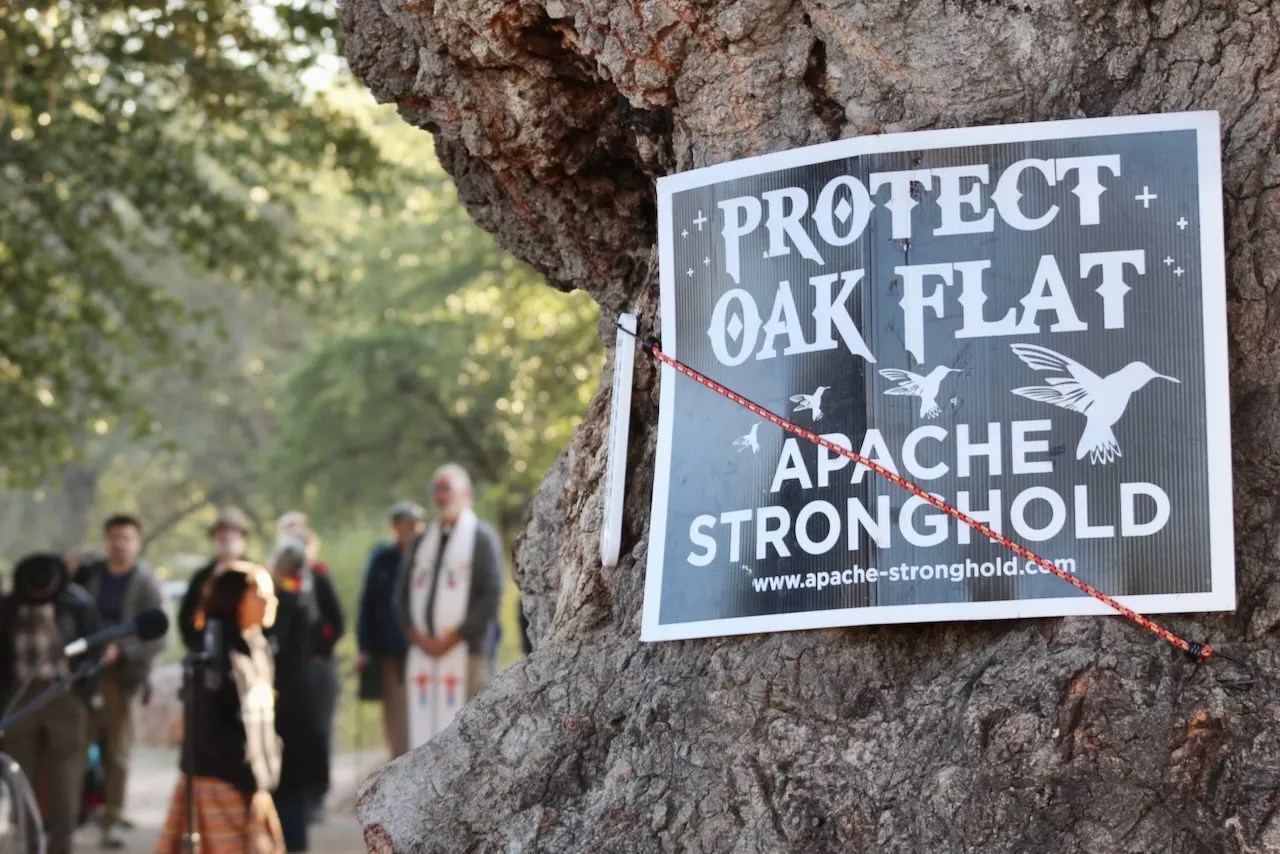
TJ L’Heureux

Audio By Carbonatix
A huge mining company has to keep its hands off the holy Apache land of Oak Flat… for now.
On Friday afternoon, a federal judge ruled that the decade-long battle over the federally-owned land roughly 70 miles east of Phoenix – and its 40 billion pounds of copper – will be for the Supreme Court to decide. That hits the brakes on a planned transfer of the land to Resolution Copper, a company owned by British-Australian mining megacorporations Rio Tinto and BHP.
Environmentalists and Indigenous groups have fought for years to protect the land from extractive interests, which would turn it into a crater. An ongoing freedom-of-religion lawsuit over Oak Flat sits at the doorstep of the Supreme Court, which has yet to say whether it will take up the case. However, the Trump administration recently announced plans to speed up the land transfer and potentially open Oak Flat to mining before the high court could weigh in.
Apache Stronghold, the group leading the charge against the land transfer, filed an emergency motion to stop the government from barrelling ahead. Friday, federal Judge Steven P. Logan was convinced, issuing an injunction to pause the swap – and the publication of an environmental review that would precede it – until the Supreme Court either declines the case or decides its merits.
“Even in the short term, (Apache Stronghold has) established a likelihood of irreparable harm should the transfer proceed,” Logan wrote, adding that the group “presented serious questions on the merits that warrant the Supreme Court’s careful scrutiny.” Logan also noted that if the land transfer wasn’t halted, it “could result in the permanent loss of Apaches’ legal rights to access their ancestral sacred site.”
It’s unclear if the federal government will appeal.
Apache Stronghold and its lawyers at Becket Fund for Religious Liberty celebrated Logan’s decision in a press release.
“We are grateful the judge stopped this land grab in its tracks so that the Supreme Court has time to protect Oak Flat from destruction,” said Dr. Wendsler Nosie Sr., Apache Stronghold’s leader and former chairman of the San Carlos Apache tribe. “The federal government and Resolution Copper have put Oak Flat on death row – they are racing to destroy our spiritual lifeblood and erase our religious traditions forever.”
Luke Goodrich, vice president and senior counsel at Becket, said in a statement that “the feds have absolutely no reason to ram through the transfer of Oak Flat while our case is standing on the doorstep of the Supreme Court. This ruling ensures that Oak Flat remains protected as the legal process continues, giving the Supreme Court time to decide if cherished Apache rituals can continue for future generations.”

Apache Stronghold leader Wendsler Nosie Sr. speaks to supporters after a court hearing on the fate of Oak Flat.
TJ L’Heureux
A history of the Oak Flat case
Also known as Chi’chil BiÅ‚dagoteel to the Apache people who revere it as their holiest place of worship, Oak Flat sits nestled in the mountains east of Phoenix. To the Apaches, it is Mecca, though they note that it was created by God and not men.
However, the Apaches don’t own it; it’s technically the property of the U.S. government. The government promised to safeguard the land for the Apaches, but broke that deal in 2014 when Congress approved a backroom land swap – brokered by Arizona Sens. John McCain and Jeff Flake – that transferred about 2,400 acres of Oak Flat land to Rio Tinto in exchange for 5,400 acres in the state owned by the company.
In 2021, opponents of the land swap, including Apache Stronghold, sued to block it. Two federal appeals court panels ruled the government could move forward with the swap, though five appeals court judges dissented, saying that the court “tragically” erred by refusing to protect Oak Flat.
Apache Stronghold petitioned the Supreme Court to take up the case, which the high court is now considering. But on April 17, the U.S. Forest Service announced that in as little as two months, it would issue an environmental impact statement on the sale, a major step toward transferring the land. That led to Apache Stronghold’s emergency motion in Logan’s court, which hosted a hearing Wednesday.
Ahead of the hearing, a group of roughly two dozen Oak Flat supporters ran over three days from the holy site to the Sandra Day O’Connor U.S. Courthouse in Phoenix to raise awareness. They piled into a courtroom to hear Goodrich’s arguments for halting the land swap and demonstrated outside the courthouse before and after the hearing.
At the hearing’s end, Logan said he would rule by May 14, one week later. Goodrich must have been convincing – ultimately, the judge needed just a couple of days.